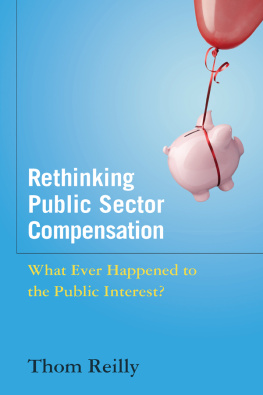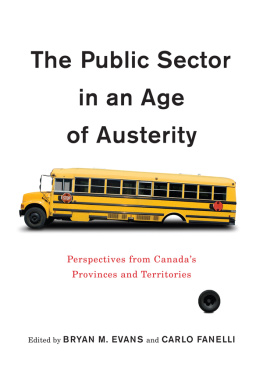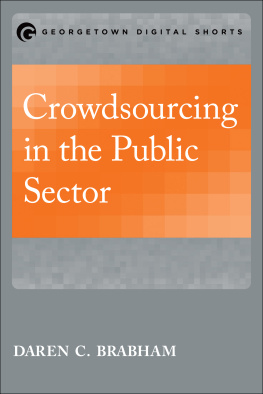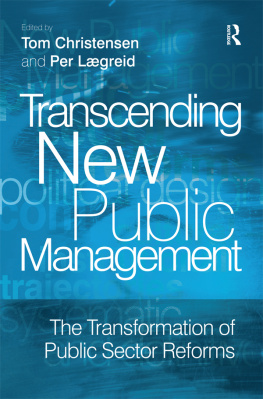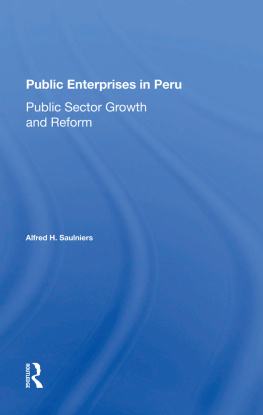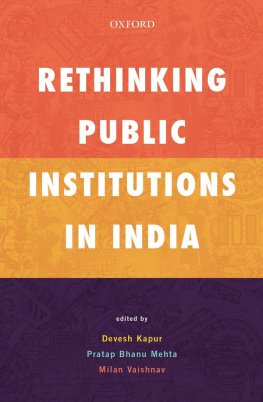Thom Reilly - Rethinking Public Sector Compensation: What Ever Happened to the Public Interest?
Here you can read online Thom Reilly - Rethinking Public Sector Compensation: What Ever Happened to the Public Interest? full text of the book (entire story) in english for free. Download pdf and epub, get meaning, cover and reviews about this ebook. year: 2012, publisher: Routledge, genre: Politics. Description of the work, (preface) as well as reviews are available. Best literature library LitArk.com created for fans of good reading and offers a wide selection of genres:
Romance novel
Science fiction
Adventure
Detective
Science
History
Home and family
Prose
Art
Politics
Computer
Non-fiction
Religion
Business
Children
Humor
Choose a favorite category and find really read worthwhile books. Enjoy immersion in the world of imagination, feel the emotions of the characters or learn something new for yourself, make an fascinating discovery.
- Book:Rethinking Public Sector Compensation: What Ever Happened to the Public Interest?
- Author:
- Publisher:Routledge
- Genre:
- Year:2012
- Rating:3 / 5
- Favourites:Add to favourites
- Your mark:
- 60
- 1
- 2
- 3
- 4
- 5
Rethinking Public Sector Compensation: What Ever Happened to the Public Interest?: summary, description and annotation
We offer to read an annotation, description, summary or preface (depends on what the author of the book "Rethinking Public Sector Compensation: What Ever Happened to the Public Interest?" wrote himself). If you haven't found the necessary information about the book — write in the comments, we will try to find it.
Thom Reilly: author's other books
Who wrote Rethinking Public Sector Compensation: What Ever Happened to the Public Interest?? Find out the surname, the name of the author of the book and a list of all author's works by series.
Rethinking Public Sector Compensation: What Ever Happened to the Public Interest? — read online for free the complete book (whole text) full work
Below is the text of the book, divided by pages. System saving the place of the last page read, allows you to conveniently read the book "Rethinking Public Sector Compensation: What Ever Happened to the Public Interest?" online for free, without having to search again every time where you left off. Put a bookmark, and you can go to the page where you finished reading at any time.
Font size:
Interval:
Bookmark:
Rethinking Public Sector Compensation |
Rethinking Public Sector Compensation |

John J. Reilly
(19332005)
711 Third Avenue, New York, NY 10017, USA
No responsibility is assumed by the publisher for any injury and/or damage to persons or property as a matter of products liability, negligence or otherwise, or from any use of operation of any methods, products, instructions or ideas contained in the material herein.
Rethinking public sector compensation : what ever happened to the public interest? / by Thom Reilly.
p. cm.
Includes bibliographical references and index.
ISBN 978-0-7656-3054-4 (hardcover : alk. paper); ISBN 978-0-7656-3055-1 (pbk: alk. paper)
1. United StatesOfficials and employeesSalaries, etc. 2. United StatesOfficials and employeesPensions. 3. State governmentsOfficials and employeesSalaries, etc. United States. 4. State governmentsOfficials and employeesPensionsUnited States. 5. Local officials and employeesSalaries, etc.United States. 6. Local officials and employeesPensionsUnited States. I. Title.
| JK776.R45 2012 331.2835173dc23 | 2011045384 |
| ISBN 13: 9780765630551 (pbk) ISBN 13: 9780765630544 (hbk) |
Font size:
Interval:
Bookmark:
Similar books «Rethinking Public Sector Compensation: What Ever Happened to the Public Interest?»
Look at similar books to Rethinking Public Sector Compensation: What Ever Happened to the Public Interest?. We have selected literature similar in name and meaning in the hope of providing readers with more options to find new, interesting, not yet read works.
Discussion, reviews of the book Rethinking Public Sector Compensation: What Ever Happened to the Public Interest? and just readers' own opinions. Leave your comments, write what you think about the work, its meaning or the main characters. Specify what exactly you liked and what you didn't like, and why you think so.

